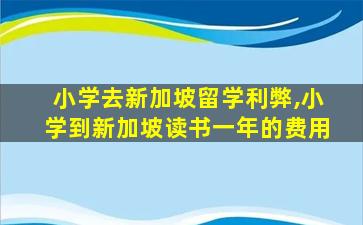高中阶段出国留学的利弊,讨论出国留学的利弊英语对话
- 作者: 张南湘
- 发布时间:2024-10-26
高中阶段出国留学的利弊
高中阶段出国留学有着许多利与弊。下面是一些可能的利弊:
利:
1. 学术优势:出国留学可以接触到更广泛且高质量的学术资源,有助于培养优秀的学术能力和知识储备。
2. 良好的语言环境:在英语为母语的国家学习,可以提高语言水平和沟通能力,有利于未来求职和社交。
3. 开阔眼界和文化体验:通过与不同文化背景的人交流和生活,能够了解不同国家的文化、价值观和思维方式,拓展视野。

4. 独立自主:出国留学需要学会自我管理和独立思考,培养独立性、自主性和解决问题的能力。
5. 吸引力:出国留学经历在求职市场上具有吸引力,可能增加就业和升学机会。
弊:
1. 家庭分离:离开家乡和家人,可能会感到孤独和思乡。
2. 适应困难:面对不同的教育制度和文化,可能需要一段时间来适应新的学习和生活方式。
3. 社交障碍:对于有些人来说,面对不同的文化和语言环境,交流和社交可能会变得更加困难。
4. 高昂费用:留学费用通常较高,包括学费、生活费和旅行费用,可能给家庭带来经济压力。
5. 文化冲击:某些留学生可能会因为与家乡的文化差异而感到不适应或困惑。
高中阶段出国留学有其利与弊。决定是否出国留学需要综合考虑个人的教育需求、家庭状况和适应能力等因素。
讨论出国留学的利弊英语对话
A: Hey, have you ever thought about studying abroad?
B: Yeah, I actually have been considering it. There are definitely some advantages to studying abroad.
A: Like what?
B: Well, for one, studying abroad can provide a great opportunity to improve our language skills. Immersing ourselves in an English-speaking environment will force us to communicate and think in English on a daily basis.
A: That's true. It can definitely help us become more fluent and confident in speaking English. Plus, it can open doors for better job opportunities in the future.
B: Absolutely. Another benefit is the chance to experience a different culture. Studying abroad allows us to step out of our comfort zones and learn about different customs, traditions, and perspectives.
A: Right, it broadens our horizons and helps us become more tolerant and understanding individuals. Additionally, studying at a renowned international institution can also enhance our academic credentials.
B: Yes, studying at a prestigious university abroad can boost our resumes and increase our chances of getting into top companies or pursuing further education.
A: However, there are also some disadvantages to consider. For starters, the cost of studying abroad can be quite high, including tuition fees, accommodation, and living expenses.
B: That's true. We should consider our financial situation before making a decision. Also, being away from our families and friends can be challenging, especially if we are homesick or facing difficulties in a foreign country.
A: Absolutely. Loneliness and cultural shock are common issues that many students experience when studying abroad. It can take time to adjust to a different lifestyle and environment.
B: So true. Another downside is that sometimes language barriers can be a huge obstacle, especially in the beginning. It can be frustrating when we can't fully express ourselves or understand others.
A: Definitely. Learning a new language takes time, and we may face difficulties in academic discussions and social interactions until we become more proficient.
B: Overall, it seems that studying abroad has its pros and cons. It's important for us to carefully weigh the advantages and disadvantages before making a decision.
A: Absolutely. By considering our goals, finances, and personal circumstances, we can make an informed choice that will benefit us in the long run.
高中阶段如何申请出国留学
申请出国留学是一个复杂的过程,需要提前计划和筹备。以下是高中阶段申请出国留学的一般步骤:
1. 规划:提前规划自己的留学目标和时间线,确定想要留学的国家和学校,并了解相关的留学要求和程序。
2. 学术准备:在高中阶段努力学习,保持良好的学术表现,争取取得优秀的成绩。有关的标准化考试如SAT、ACT、TOEFL或IELTS也需要提前准备。
3. 选择留学中介:如果需要,可以选择合适的留学中介机构来获取专业的留学指导和帮助。选择权威可靠的中介机构对整个申请过程非常重要。
4. 填写申请表:根据留学目标国家和学校的要求,填写留学申请表,并准备相应的申请材料,包括学术成绩单、推荐信、个人陈述和简历等。
5. 考试准备:根据目标学校的要求,准备并参加标准化考试,如SAT、ACT、TOEFL或IELTS。参加课外活动和实习等也可以提高申请的竞争力。
6. 申请奖学金:如果有需要,可以寻找并申请各种奖学金和助学金。了解目标国家和学校的奖学金机会,并根据要求准备申请材料。
7. 申请签证:在获得学校录取通知书后,根据目标国家的要求准备签证申请材料,并按时提交申请。
需要注意的是,这只是一般的步骤,具体的申请程序可能因国家、学校和个人情况而有所不同。因此,在申请之前,最好详细了解目标国家和学校的具体要求,以确保申请的成功。
读国内二本或出国留学利弊
读国内二本或出国留学都有各自的利弊。
读国内二本的利点包括:
1. 相对于出国留学,国内二本的费用相对较低,包括学费和生活费,对于家庭经济条件有限的学生来说更加可负担。
2. 国内二本的学制较短,一般为四年,相比于出国留学需要更多的时间投入。
读国内二本的劣势包括:
1. 国内二本的教育资源相对有限,师资力量和教学设施可能不如一些重点大学,学生的学习和发展空间可能相对较小。
2. 国内二本的学位可能在就业市场上竞争力相对较低,无法与一些名校或海外留学生相媲美。
出国留学的优点包括:
1. 出国留学可以接触到更广阔的知识和文化,拓展自己的国际视野和语言能力。
2. 有机会选择更好的大学和专业,获得更优质的教育资源,提高学术水平和竞争力。
3. 在留学国家就业的机会更多,有机会接触到更广泛的工作环境和机会。
出国留学的缺点包括:
1. 高昂的费用是出国留学的一大挑战,包括学费、生活费和签证费用等。

2. 离开家人和熟悉的环境,面临着文化差异和社交适应的压力。
3. 学业和生活的压力可能增加,在异国他乡需要自己独立生活和应对各种问题。
因此,选择读国内二本或出国留学是一个个人的决定,需要综合考虑经济条件、个人发展需求和学习能力等因素。




